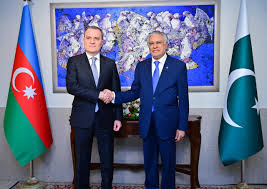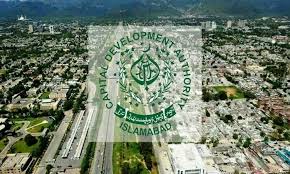Pakistan, Azerbaijan resolve to enhance bilateral cooperation including in trade, connectivity

Celina Ali
Islamabad: Pakistan and Azerbaijan on Thursday resolved to enhance cooperation in multiple sectors including trade, investment, energy and connectivity to exploit the huge potential of the friendly relationship between the two countries. The bilateral ties and cooperation were discussed as Deputy Prime Minister and Foreign Minister Ishaq Dar and Foreign Minister of Azerbaijan Jeyhun Bayramov met here and discussed the multidimensional bilateral and regional agenda encompassing bilateral and international matters.
Addressing a joint press stakeout, Deputy Prime Minister Ishaq Dar told the media that both countries would further enhance cooperation in trade, investment connectivity, energy and defense sectors. He said the two countries were taking measures to increase bilateral investment, especially in the energy sector. The joint working group on energy would be critical in promoting cooperation in this sector, he added. He said both countries also desired to promote parliamentary and cultural exchanges to promote business-to-business and academic linkages, besides boosting cooperation in renewable energy.

The deputy prime minister expressed good wishes for Azerbaijan to host the COP 29 meeting and assured Pakistan’s support. Both sides held a detailed discussion on the prevailing situation in Gaza and called for an immediate cessation of Israeli hostilities and the establishment of an independent Palestine state with Quds Al Sharif as its capital. Ishaq Dar thanked Azerbaijan for its constant and principled support on the Kashmir issue and reiterated Pakistan’s support for Azerbaijan’s sovereignty and territorial integrity. Azerbaijan’s Foreign Minister Jeyhun Bayramov told the media that in their meeting, they discussed ways to strengthen cooperation and strategic partnership to take the bilateral relationship to the next level.
He said the huge potential for economic and trade cooperation still remained untapped which necessitated the launch of joint economic projects in energy, tourism, transport, information technology, pharmaceuticals and transport. He told the meeting that the 8th Pakistan-Azerbaijan Inter-Governmental Commission to be held in Islamabad later this year would give further impetus to economic cooperation. He invited Pakistan’s business community to benefit from the conducive business conditions in his country and connectivity projects. Mentioning six direct flights between the two countries and the 55,000 Pakistanis visiting Azerbaijan last year, Foreign Minister Jeyhun Bayramov said the upcoming COP29 meeting would also create opportunities for cooperation in energy and climate change.
He also appreciated Pakistan’s firm stance along with political and moral support on the Karabakh conflict and reiterated his country’s principled position Kashmir dispute calling for its peaceful resolution in accordance with the UN Security Council’s resolutions. To a question, he said that realizing the adverse impacts of climate change across the world, including the devastation caused by floods in Pakistan, he said Azerbaijan would make efforts to ensure that the developing countries could get the necessary resources to help promote adaptation and execute technical and capacity building projects. In this regard, DPM Dar said that the floods had inflicted $34 billion loss to Pakistan and the country was still struggling for the reconstruction and rehabilitation of the affected population.
Responding to another query, he said that energy security and connectivity were high on the incumbent government’s agenda and highlighted Pakistan’s ideal strategic location with the potential to provide connectivity to East China, South Asian countries and others. Earlier, both leaders held delegation-level talks wherein they reviewed progress on bilateral relations and exchanged views on regional and global developments. The two sides expressed strong commitment and resolve to further strengthen bilateral strategic relations and broaden the scope of cooperation in all areas of interest, including trade, investment, energy, defence, education, climate action and regional connectivity.





